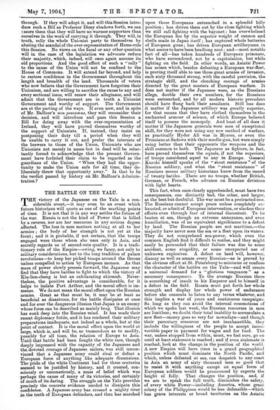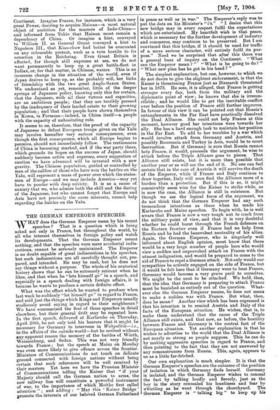T HE victory of the Japanese on the Yalu is a
con- siderable event,—it may even be an event which future historians will quote as one of the marking points of time. It is not that it in any way settles the future of the war. Russia is not the kind of Power that is killed by a reverse, nor are her resources in any serious degree affected. The loss in men matters nothing at all to her armies ; the body of her strength is not yet at the front ; and it is probable, if not certain, that the troops engaged were those whom she uses only, in Asia, and secretly regards as of second-rate quality. It is a tradi- tionary rule of the Empire—owing, we fancy, not only to military considerations, but to the long tradition of palace revolutions—to keep her picked troops around the throne unless compelled to action by European menace. As that mass of power slowly presses forward, the Japanese may find that they have battles to fight to which the victory of Kiu-lien-cheng is but an exhilarating skirmish. Never- theless, the positive advantage is considerable, for it helps to isolate Port Arthur, and the moral effect is im- mense. We do not mean the moral effect upon the Russian armies. Great as that must be. it may be at least as beneficial as disastrous, for the battle dissipates at once and for ever the dangerous illusion that Japan is an enemy whose force can be described as mainly brag. That illusion has sunk deep into the Russian mind. It has made their recent diplomacy futile, and it has rendered their military preparations inadequate, not indeed as a whole, but at the point of contact. It is the moral effect upon the world at large, which is, and will be, so tremendous as to modify, possibly 'for all time, the relation of Europe to Asia. Until that battle had been fought the white race, though deeply impressed with the capacity of the Japanese and the, devoted. courage of Japanese, sailors, was still uncon- vinced that a Japanese army could rival or defeat a European force of anything like adequate dimensions. The pride of the white Continent had for three centuries seemed to be justified by history, and it created, con- sciously or unconsciously, a mass of belief which was - perhaps the cause of many of its victories, and certainly of much of its daring. The struggle on the Yalu provides precisely the concrete evidence needed to dissipate this confidence. A Japanese army has crossed a mighty river in the teeth of European defenders, and then has marched upon those Europeans entrenched in a splendid hilly position ; has driven them out by the close fighting which we still call fighting with the bayonet ; has overwhelmed the' by fire i the superior weight of cannon and shells made in Japan itself ; has captured whole batteries of European guns ; has driven European artillerymen in what seems to have been headlong rout ; and—most notable fact of all—has taken hundreds of European prisoners, who have surrendered, not by a capitulation, but while fighting on the field. In other words, an Asiatic Power has arisen which, besides defeating a European war-fleet, is proving itself able to use three great armies of invasion, each sixty thousand strong, with the careful prevision, the strategic skill, and the clenching courage of armies directed by the great masters of European warfare. It does not matter if the Japanese were, as the Russians allege, double their own numbers, for the Russians were entrenched, and by all modern historic precedent should have flung back their assailants. Still less does it matter if the Japanese artillery was greatly superior, for that means that they have clothed themselves in the enchanted armour of science, of which Europe believed itself to possess the monopoly. And least of all does it matter if the Japanese generals were men of exceptional skill, for they were not using any new method of warfare, as practically Hyder Ali was in Mysore, or even the Prussians at Sadowa with their needle-gun, but were simply using better than their opponents the weapons and the skill common to both. The Japanese as fighters, in fact, have proved themselves the equals, if not the superiors, of troops considered equal to any in Europe. General Kuroki himself speaks of the "stout resistance" of the Russian soldiery, and what the " stout resistance" of Russians means military historians know from the record of twenty battles. There are no troops, whether British, German, or French, who advance on Russian divisions with light hearts.
This fact, when once clearly apprehended, must have two consequences, one distinctly bad, the other, and larger, at the best but doubtful. The war must be a protracted oue. The Russians cannot accept peace unless completely ex- hausted, or admit of European intervention, or slacken their efforts even through fear of internal discontent. To be beaten at sea, though an extreme annoyance, and even humiliation, was of no equivalent significance to a defeat by land. The Russian people are not maritime,—the majority have never seen the sea or a fleet upon its waters. They do not comprehend sea-power, which even the common English find it difficult to realise, and they might easily be persuaded that their failure was due to some accident, some stupidity, or some unexpected use of unknown explosives. A defeat on land will, however, dismay as well as amaze every Russian—as is proved. by the obvious effort at St. Petersburg to minimise or confuse the character of the battles on the Yalu—and will create a universal demand for a ".glorious vengeance" as a necessary consequence. To the average Russian there is something of insult to his Emperor and to himself in a defeat in the field. Russia must put forth her whole strength and display her whole power of endurance before she consents to listen to any terms whatever, and this implies a. war of years and continuous campaigns. So. long as they can avoid the internal commotions of which we spoke last week, the Russian resources in men are limitless; we doubt their total inability to accumulate a new fleet—money goes so very far nowadays—and though their pecuniary resources are not inexhaustible, they include the willingness of the people to accept incon- vertible paper in payment for wages and for food. The war, unless stopped from within, must, we feel sure, go on until at least stalemate is reached ; and if even stalemate is reached, look at the change in the position of the world. A new Empire will have risen in a grand geographical position which must dominate the North Pacific, and which, unless defeated at sea, can despatch to any coast in Asia an army of sixty thousand men so good that to resist it with anything except an equal force. of European soldiers would be pronounced by experts the height of folly. That changes the position, and, if we are to speak the full truth, diminishes the safety, of every white Power—including America, whose great colony of the Philippines would be less defensible—which has grave interests or broad territories on the Asiatic Continent. Imagine France, for instance, which is a very great Power, desiring to acquire Hainan—a most natural object of ambition for the masters of Indo-China— and informed from Tokio that Hainan must remain a dependency of China. Or imagine a hint, conveyed to William II. as General Grant conveyed a hint to Napoleon III., that Kiao-chow bad better be evacuated on any colourable pretext, such as a vote hostile to its retention in the Reichstag. Even Great Britain is affected, for though still supreme at sea, we do not went permanently to keep up a great battle-fleet in Indian, or, for that matter, in Chinese, waters. This is an immense change in the situation of the world, even if Japan desires to keep up, as she probably will, her links of friendship with the two great Anglo-Saxon States. We understand as yet, remember, little of the deeper springs of Japanese policy, knowing only this for certain, that the Japanese, with all their virtues and capacities, are an ambitious people ; that they are terribly pressed by the inadequacy of their landed estate to their growing population ; and that their people have shown themselves in Korea, in Formosa—indeed, in China itself—a people with the capacity of unhesitating rule.
It seems to us, therefore, that the proof of the capacity of Japanese to defeat European troops given on the Yalu may involve hereafter very serious consequences, even though the first consequence, which all Europe begins to perceive, should not immediately follow. The restlessness of China is becoming marked, and if the war party there, which grounds its hopes on the success of Japan, should suddenly become active and supreme, every suggestion of caution we have advanced will be invested with a new gravity. The Chinese population, guided or controlled by men of the calibre of those who have won the battles on the Yalu, will represent a mass of power over which the states- men of Europe—and we may include America—may yet have to ponder with deep anxiety. It is as a cause of anxiety that we, who admire both the skill and the daring of the Japanese, but who cannot forget that Europe and Asia have not precisely the same interests, cannot help regarding the battles on the Yalu.











































 Previous page
Previous page